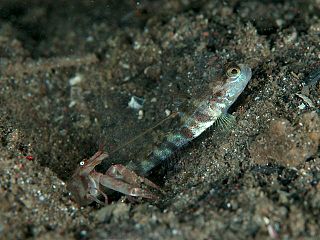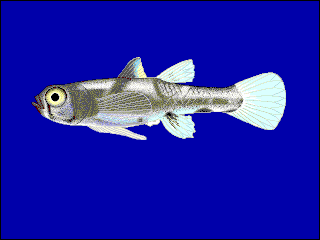
Gobiodon is a genus of gobies also known as coral gobies or "clown gobies". Generally, coral gobies, unlike the rest of the family Gobiidae, are not burrowers, but instead prefer to inhabit the branches of certain Acropora or similar hard corals.

Exyrias is a genus of gobies mostly native to marine waters of the Indian Ocean and the western Pacific Ocean with one freshwater species (E. volcanus) known from the Philippines.

Exyrias akihito is a species of marine goby. Since the recent description of this species it has been found to have a wide distribution in the western Pacific including the Great Barrier Reef, New Guinea, Indonesia, the Philippines and the Yaeyama Islands, Japan. One individual was photographed in Palau, and on January 13, 2005 one was caught in the lagoon of Majuro Atoll in the Marshall Islands. This animal had only 9 soft rays in its dorsal fin instead of the normal 10, a congenital abnormality known to occasionally occur in gobies and other fish.

Brachygobius is a small genus of gobies. They are popular aquarium fish where a number of species are sold as bumblebee gobies because their colours are similar to those of bumblebees.

Glossogobius is a genus of gobies native to fresh, brackish and marine waters from Africa to the coasts of the western Pacific Ocean. They are found in Madagascar, South Africa, Japan, Thailand, Australia, Indonesia, Bangladesh, the Philippines, Taiwan, Papua New Guinea, Singapore, Malawi, Eswatini, Botswana, Kenya, Zimbabwe, Tanzania, Mozambique, the Solomon Islands, Palau, Fiji, New Caledonia, India, Laos, Sri Lanka, Myanmar, Borneo, Nepal, Brunei Darussalam, Micronesia, Cambodia, Viet Nam, China, Réunion, the Seychelles, Mauritius, the Caroline Islands, Vanuatu, Malaysia and Russia. The genus also includes a troglobitic species, G. ankaranensis.

Knipowitschia is a genus of marine, fresh and brackish water gobies native to Eurasia. The genus name almost certainly honours Nikolai Mikhailovich Knipovich (1862-1938), a biologist who led a number of expeditions to the Caspian Sea.

Redigobius is a genus of fish in the goby family, Gobiidae, known commonly as dualspot gobies. They are native to the western Indo-Pacific region, where they occur in estuaries and freshwater habitats just above the tidal influence.

Akihito is the Emperor Emeritus of Japan who reigned as the 125th Emperor of Japan from 7 January 1989 until his abdication on 30 April 2019. He presided over the Heisei (平成) era, Heisei being an expression of achieving peace worldwide.

Chromogobius is a small genus of gobies native to the eastern Atlantic Ocean through the Mediterranean and Adriatic seas to the Black Sea.

True gobies were a subfamily, the Gobiinae, of the goby family Gobiidae, although the 5th edition of the Fishes of the World does not subdivide the Gobiidae into subfamilies. They are found in all oceans and a few rivers and lakes, but most live in warm waters. Altogether, the Gobiinae unite about 1149 described species in 160 genera, and new ones are still being discovered in numbers.

Tridentiger is a genus of fish in the subfamily of gobies called the Gobionellinae, known commonly as the tripletooth gobies.

The Sicydiinae are a small subfamily of freshwater gobies, with only nine genera. They are usually found in fast-moving mountain streams in tropical islands. They are characterized by highly developed rounded suction discs and an amphidromous lifecycle. Adult lengths range from 2 to 15 cm. Some species are popular in the aquarium trade. The genera included under Sicydiinae are:
Akihito is a genus of gobies native to streams in Vanuatu.
Akihito vanuatu, the Vanuatu's emperor, is a species of fish in the family Oxudercidae, the gobies. It is endemic to Vanuatu, where it inhabits streams and pools. Males of this species can reach a length of 4.3 centimetres (1.7 in) SL while females can reach 3.9 centimetres (1.5 in) SL.

Astrabe is a small genus of gobies native to the marine waters around Japan.

Callogobius is a genus of fish in the family Gobiidae found in brackish and marine waters of the Indian and Pacific Ocean.

Myersina is a genus of ray-finned fish from the family Gobiidae, the true gobies which are found from the Atlantic coast of South Africa through the Indian Ocean to the western Pacific Ocean. The generic name honours the American ichthyologist George S. Myers (1905-1985) who was a younger colleague of Herre's at the time at which he described the genus and who went on to be president of the American Society of Ichthyologists and Herpetologists, the head of the Division of Fishes at the United States National Museum and an ichthyologist for the United States Fish and Wildlife Service.

Pandaka is a genus of fish in the goby subfamily, Gobionellinae, native to fresh, brackish and marine waters of Asia and the western Pacific Ocean. Some species in the genus are among the smallest fish in the world; the male P. pygmaea can be just 9 mm (0.35 in) in standard length at maturity.
Platygobiopsis is a genus of gobies native to the western Pacific Ocean.
Platygobiopsis akihito, the Imperial goby, is a species of goby known only from the area of Flores, Indonesia. This species reaches a length of 13 cm (5.1 in).















